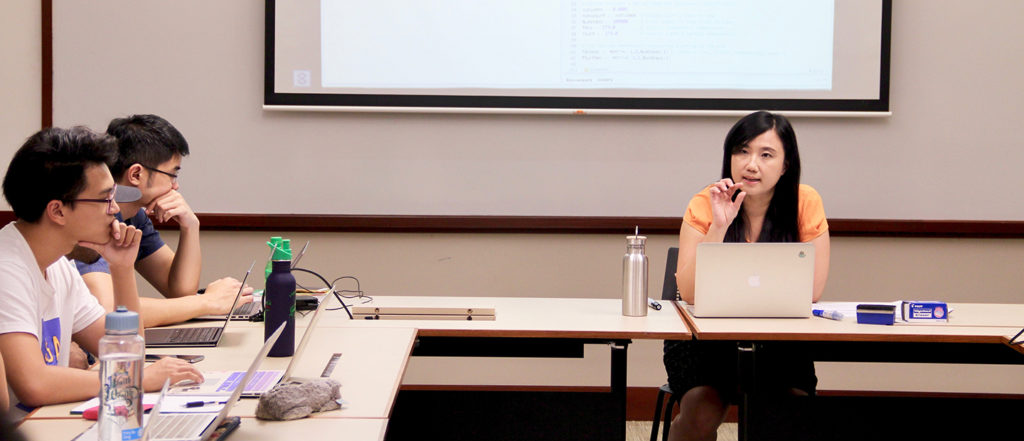Students and faculty conduct research on Quantum Information and Computation in Yale-NUS College

Over the past few decades, the study of Quantum Information Science (QIS) has emerged as a field with startling potential to revolutionise science and engineering, and by extension, the way we live. Its roots stem from the 1990s when pioneers like Charles H. Bennett explored ways to amalgamate quantum mechanics with the classical Turing machine. Almost two decades on, the appeal and significance of QIS has only intensified as more scientists seek to incorporate it to advance information technology in today’s Information Age.
At Yale-NUS, Assistant Professor of Science (Physics) Ng Hui Khoon is one of several whose research interest centralises on Quantum Information and Computation.
As computers become increasingly ubiquitous, Dr Ng remarked on the weighty relevance of her research interests.
“Largely, what scientists in this field are investigating is how classical systems, like the computers we now use, can be eventually replaced by quantum systems which are far more efficient in problem solving and optimisation. Though we are decades away in reaching the promise of quantum computers, we are already seeing the beginnings of it in the form of quantum annealing.”
Quantum annealing is a tool useful in many optimisation problems. Testament to these early signs of the quantum technology wave is D-Wave Systems Inc., a quantum computing company established in 1999 and based in Canada. Its clients range from Google to NASA to Temporal Defense Systems. Returning to her research interests, she added, “The biggest barrier in quantum computing is noise. My research focuses on noise control through quantum error correction and fault tolerance. Quantum systems, e.g., single photons–tiny packets of energy–or single atoms, are extremely fragile; just a little noise would disrupt its quantum information processing ability.”
Over the recent summer break, Dr Ng took several student researchers under her wing in investigating various areas in the field of Quantum Information and Computation. Ivan Soh (Class of 2019), whose project was on Quantum Entanglement Generation, was one of them.
Explaining his project, Ivan said, “Quantum Entanglement Generation is like a massive matchmaking process. Imagine quantum bit systems with people and hamiltonians (operator that acts on the system) as matchmakers; where the project is about finding, assessing and speeding up the process of pairing between specific people. The crux of the issue at hand is that speeding up the matchmaking requires infinite amount of energy in a finite amount of time.”
Ivan’s project was one of the many research projects supported under the Centre of International & Professional Experience (CIPE)’s Summer Research Programme (SRP). The programme provides opportunities for first, second and third-year students to pursue full-time, appropriately structured research for 8-10 consecutive weeks, allowing them to explore a nascent interest in research and deepen their understanding of the day-to-day realities of a research career.
“Working with Dr Ng for this research project has given me great exposure to the multiple kinds of research I may be interested in. I’ve learnt a lot about how to build on a literature review and execute an action, as well as modelling and data simulation,” said Ivan.
Scientific research and inquiry form an important component in learning at Yale-NUS. As all Yale-NUS students go through the Common Curriculum, a linked set of courses spanning the fields of the natural and social sciences and humanities, they also gain exposure to the necessary tools to view science through diverse lenses. Echoing this was Dr Ng who felt that the interdisciplinary approach of a liberal arts background allows student researchers to widen their scope of scientific analysis beyond traditional boundaries and extend its relevance to society.
Aside from the SRP, Yale-NUS also offers many other opportunities for students keen to explore research work or to simply gain better exposure in a particular field of study. Previously, Ivan did a research project on Advanced 2D Material which cemented his decision to take up the SRP this year.
On the opportunities available to students in the College, Dr Ng shared that there is a very open and welcoming environment in Yale-NUS which allows students to take on key roles in research projects, whether faculty-led or student-initiated. “With a tradition of getting students into the laboratories early, by the time students embark on their capstone projects in their senior year, many already have the fundamental research skillsets and knowledge to make educated decisions.”





